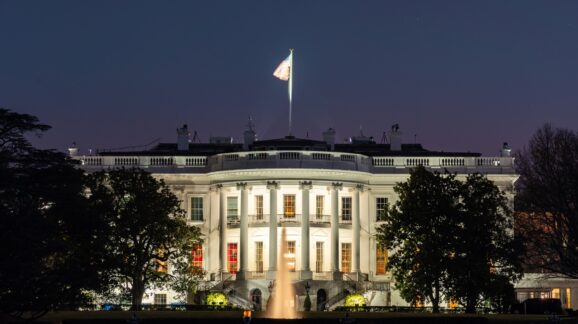What’s wrong with Bidenomics?

Photo Credit: Getty
Yesterday, I pointed out that in the looming threat of a government shutdown, President Joe Biden is aiming to cement as his legacy something that he himself is modestly calling “Bidenomics.”
In that blog post, I briefly explained what Bidenomics is, argued Congress has every right and reason to say no to this, and promised a more thorough evisceration today. Promises made, promises kept. A non-exhaustive list of reasons why Bidenomics is bad for America begins right now:
Bidenomics promotes more dependency on government
A liberty movement preoccupied with environmental, financial, and other ill-advised economic regulation overlooks social regulation at its peril.
The most salient feature of Bidenomics consists of the cross agency, “whole-of-government” seduction of youths and the able-bodied adult population into reliance on big government programs like loan relief, free childcare, housing interventions at taxpayer expense, and much more. “It’s about being able to look your kid in the eye and say, ‘Honey, it’s going to be okay,’ and mean it. That’s Bidenomics,” said President Biden.
Vice President Kamala Harris’s new “Fight for our Freedoms” sessions feature the pedal tones of open-ended “equity” and “justice,” with the cherry on top new rallying cry for Washington to address the artificial “climate anxiety” that the government itself deliberately fuels. Her strain of Bidenomics is more overtly selfish and grabby, imploring college students to demand: “These are the things I want from my government, I want from my country, I want for my life and my future.” The “fight for freedom” entails depriving other citizens of their freedoms in the pursuit of—as Harris literally said twice to a Hampton, VA audience—“equal outcomes.”
The intertwined nature of economic and social regulation under Bidenomics will become more obvious as cross-agency pursuits of the likes of a central bank digital currency (CBDC) and the agitations over “environmental justice” proceed under leadership inclined toward censorship of dissenting voices.
Bidenomics further entrenches government control
We noted Biden’s ambitious claims about addressing the climate change he calls an “existential threat.”
His initiatives draw energy from awful legislation like the infrastructure, inflation, and tech laws that displace the private sector in favor of government controls and “public/private partnerships.” These partnerships create more of the wrong things, such as wasting $12 billion to convert factories to electric car production and other clean energy “investments” and “opportunities.”
This polluted fusion of federal spending and regulation is something Congress cannot afford to ignore and must mobilize against.
Bidenomics comes with strings attached
Companies seeking Faustian-bargain funding through initiatives like Biden’s CHIPS and Science Act and the Bipartisan Infrastructure Law will discover they increasingly need to commit to many requirements, from providing childcare services to adopting green energy sourcing and perhaps even agreeing to profit-sharing with the federal government.
Bidenomics will increase rule by regulatory dark matter
What we call “regulatory dark matter” is sub-regulatory guidance. These are documents, memoranda and decrees issued by the Federal Trade Commission, the Department of Transportation and other agencies. They ought to be abolished or right-sized at the very least. This guidance covers a range of topics, including competition policy, environmental justice, equity, artificial intelligence, and so much more.
Several bills already passed threaten to unleash a torrent of informal rulings and declarations, further cementing the federal government’s multi-sectoral dominance in the economy without even the courtesy of notice-and-comment rulemaking.
Bidenomics will increase consumer prices
The emphasis on renewables and “net-zero” carbon fantasies in Bidenomics favors certain companies over others. Biden’s insistence on compulsory partnerships with unions, community colleges, and minority-owned businesses in order to participate in the federal largesse will jack up costs for consumers directly, as well as indirectly through economic distortions. So too will his “Made in America” mandates and union labor directives generally.
Bidenomics counters ‘junk fees’ with junk economics
The White House postures by taking aim at credit card late fees, bank overdraft fees, hotel and airline charges, and prescription drug prices, labeling them as “junk fees.”
New Bidenomics regulations and guidance schemes here will generally not improve outcomes in these areas. The administration conveniently ignores that its targets are already among the most heavily regulated entities in society. Such observations would normally give one pause before barreling ahead with new regulation, but Bidenomics is not about careful deliberation.
Bidenomics hurts the poor.
Despite all the superhero talk of securing equity and justice, Biden’s economic micromanagement will have negative consequences for the poor. Instead of promoting vigorous capitalism and a society flush with businesses, jobs, opportunity and wealth, Bidenomics involves regulatory hurdles that will harm small businesses more than large ones, aggravating dependency instead of spurring entrepreneurship across all sectors of society.
—
This may seem daunting but all hope is not lost. Congress can say no to much of this agenda, and ought to do so as part of the looming showdown over the 2024 federal budget.
Bidenomics takes teamwork, and there should be no USA in “team.” Bidenomics spending can only hurt us if Congress opens the purse strings.